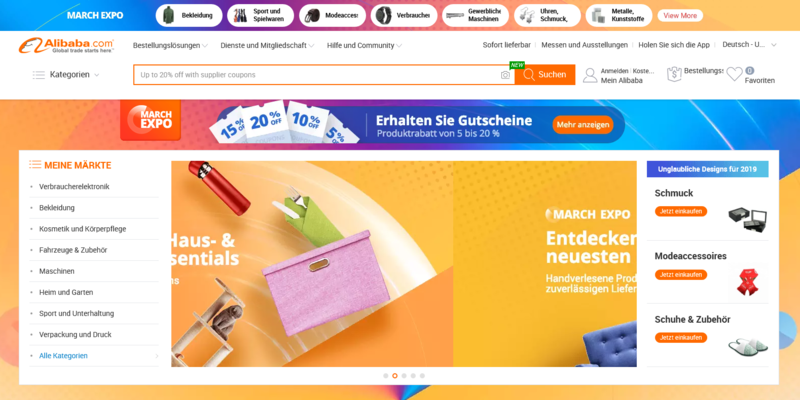Alibaba has been launched in Germany
Although more B2B than B2C platform for e-commerce, Alibaba itself is slowly teaching Amazon to fear. The Chinese giant has now also hit the ground in Europe without a whimper. However, he is apparently less interested in local consumers than in global online trading.
Hangzhou 175 km southwest of Shanghai was once described by Marco Polo as the most beautiful and magnificent city in the world. Since the 1980s, it has lost much of its charm because, like Suzhou, the other old imperial city not far from Shanghai, today’s industrial metropolis with over nine million inhabitants has attracted many companies from home and abroad. The Alibaba Group has also been based in Hangzhou since 1999. These include the B2B e-commerce platform Alibaba. com, which he says is the largest in the world, and the online auction house Taobao.
From teacher to billionaire to philanthropist
Founder Jack Ma (Ma Yun), a former English teacher, announced in September 2018 that he would be relinquishing the position of Chairman in the new year to focus on philanthropy and education. With an estimated fortune of 34. 44 billion euros and number 21 among the richest of the rich in the world according to Vermögensmagazin, he can afford to retire at 55. Without much hype Alibaba soon started his European engagement and a German appearance.
Hub for “Made in Germany”
As Felix Lee, the China correspondent for taz, quotes Alibaba’s head of Europe, China’s largest privately owned company is not so concerned with rolling up the German market from the bottom up. Rather, Alibaba’s aim is to “help local brands and retailers to reach the over 700 million active consumers on our retail marketplaces”; with “Made in Germany”, the highly esteemed quality seal in China. This means that german. alibaba. com will initially serve as a hub for German goods to China and Chinese consumers abroad.
Liège to become Gateway to China
The huge European logistics centre currently under construction in Liège, Belgium, is to become something like a gateway to China. China has around 1. 4 billion inhabitants, over 700 million of whom are regularly online. According to him, a further 700 million have not yet jumped on the online train, but this could soon change.
“A ghost goes around in Europe – the ghost of Alibaba”, Lee opened his contribution. At the end of 2017, the online giant announced that it would be setting up a gigantic logistics centre with an area of over 220,000 square metres at Liège Airport in Belgium for an investment sum of at least 75 million euros. In January, the Berlin start-up Data Artisans was taken over, for which Alibaba is said to have invested around 90 million euros. The taz article also states that the rumor is that the Chinese giant could take over Zalando.
Singles’ Day sales make others pale
The turnover of the Alibaba Group in 2018 is still modest at 250 billion yuan or 66. 42 billion US dollars compared to 232. 9 billion dollars from Amazon, but on Singles’ Day on 11. 11. 1918 alone Alibaba reported a turnover of 30. 8 billion dollars. The fear among other e-commerce drivers is correspondingly great when the Chinese giant first sets about conquering the world market.
In fact, that’s already happened. During the search for SAP Ariba PunchOut for connecting external product catalogs in the procurement system, the German Alibaba page popped up by chance. The design still needs some getting used to and is more reminiscent of early platforms for electronics purchasing, but on closer inspection is quite coherent.
[plista]


